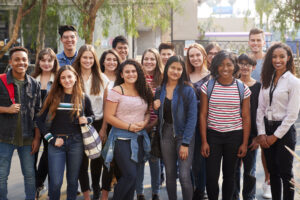AP classes are a core part of high school for many students. Often the hardest courses offered, APs bill themselves as the equivalent of college coursework, and allow you to experience the level of rigor you will see in college, and earn some college credit along the way.
Of course, there is one minor problem with all of this. Namely, AP classes are nothing like college classes, in terms of structure, material, assessments, and most every other metric. And yet, AP classes are still a valuable part of high school curriculums. In this article we’re going to examine how AP classes are dissimilar from their college counterparts, how they are somewhat similar, and what benefits they do provide when it comes to readying yourself for college. Let’s get started!
What’s the Difference Between AP and College Coursework?
There isn’t one difference, but several. We’ll cover these by type, to fully explain what they are, and how each impacts the class and experience. As for how I know all of this; I have been to college, and in high school I took 10 APs. While that was a while ago (longer than I’d like perhaps), it did give me good insight into how the courses function, and how they differ from what you find at college.
Structural Differences
These are the biggest, but also least meaningful, differences. The way college works is simply different from high school, and AP classes are limited by their environs. Things like the length of the classes, how often you meet, etiquette within them, how you interact with your teachers; these all differ greatly between high school and college.
While these are not the most important differences in terms of what you will learn, they do greatly impact how you will learn, and are the most obvious difference coming in. These are also the factors that cause the most culture shock when students transition between high school and college. In spite of that, these are the least important differences; they merely impact form, rather than function.
Content Differences
The major difference here is how much you are expected to learn, and how quickly. The content itself differs depending on the course. Math is math, you just learn at a faster clip in college. All of Calculus BC, for example, is a single semester course, rather than the full year you have in high school.
English classes can be similar, in that you read and analyze texts, but you are expected to read far more, both per week and over the course of the class. History has some of the biggest differences. You may have a single textbook, but more often have several the teacher pulls from, along with supporting sources and analyses you need to read.
For humanities and social sciences, the readings you do are at a higher level of complexity generally, and have more of a focus on primary sources. College is where you begin performing novel analysis of these sources, and so they feature more heavily in the content you consume. Rather than quotes in a larger text, you will more often read the source itself in full.
In the sciences, the biggest difference comes in the labs you do. You had to do labs if you did any of the AP sciences, but the amount of equipment and kinds of lab work you will be asked to do in college exceeds them.
In language classes, the content is almost identical, the pace is just much much faster than what you see in highschool. There are, after all, only so many good ways to learn a language.
Assessment Differences
In general, there are two kinds of courses you encounter in college (this is an oversimplification, but holds broadly true): those which assign problem sets, and those which assign essays. Usually math and science classes are the former, while humanities and social sciences the latter.
The number of assessments you receive which contribute to your final grade is far lower in college. It also varies wildly between professors. Some give credit for participation; others don’t even track attendance. In general there are fewer graded assignments, often far fewer. Homework is often a completion grade; its purpose is to help you prepare for exams, and you are only hurting yourself if you do it poorly.
Exams are not given in all classes. Some will have in-class essays for exams, but many prefer final essays instead. Given how exciting reading some students’ handwriting can be (I myself am guilty here) we can’t really blame them. There are also far fewer tests; usually a midterm and a final. Essays vary, but it’s usually two or three for a course. I had one class where the entire grade was the final essay, but that was an exception.
Finally, and the biggest difference, nobody wants to see five paragraph essays in college. We understand why it’s asked for by College Board, and it is an alright introduction to how an essay can be organized, but none of your professors are looking for this. Your essays should still have an introduction and conclusion, but sticking strictly to the five paragraph form is one of the first habits to break in college.
How AP Classes Prepare You For College
So AP classes are almost nothing like what you will experience in college, in terms of what and how you learn, and how that learning is assessed. This doesn’t mean they are without merit, merely that they should not be taken for something they aren’t. AP classes are AP classes, and college courses are college courses.
That said, AP classes do still prepare you for college in several key ways. This is because AP classes act as a bridge; they are more akin to college coursework than the other classes you take in high school, while still falling short of what you will actually experience once you are there.
The five paragraph essays, for example, are not what you should write in college. They are a good introduction to how to structure an argumentative essay, to present and defend a thesis. The labs you do in AP Chemistry and Biology, and the lab reports you write, are again short of what you will do in college, but serve as an introduction to the language and equipment you will be using.
There is perhaps no way to adequately mirror the environment of college classes in high school; they are different institutions, and serve different purposes. That said, AP classes do serve as a kind of transition to the way college operates, and the expectations you will face once you are there.
So What Are College Classes Like?
So what can you expect from college courses? The answer is, unsatisfyingly, it depends. Professors have far more freedom when it comes to setting standards and choosing content for their courses than any high school teacher. Even courses where the material is fairly standard, such as calculus, will vary widely between schools and even between professors at a school.
That said, there are some commonalities; just don’t be surprised if these are not true in all cases. Here are the general kinds of courses you can expect to encounter at college:
- Lecture courses. Depending on the size of your school, these can have anywhere from 50 to 300 students (or more). The instructor will have several teaching assistants, who will aid with grading and meeting students in office hours. These are usually introductory or prerequisite classes.
- Discussion classes. These are courses with 20 or fewer students, and usually require active participation. These are more common in upper level specialized courses which fewer students take.
- Language classes. These are always on the smaller end to facilitate discussion. They also meet more often, as frequent practice with a language helps mastery. These courses can be incredibly small for less popular languages, especially at higher levels (the smallest classes I had in college were always languages).
You will have more work in college classes, but professors are often more flexible with deadlines, if they know in advance (especially well in advance). It is much harder to build relationships with professors, especially in lecture courses, but doing so can be very rewarding.
Final Thoughts
AP classes are and will remain a staple of high school instruction in the US. They are quite useful things, and we recommend students take them. We hope this article has clarified some of what they are, and what they are not. AP classes are wonderful things, but they are not the same as college. And that’s ok.
Of course, not all schools offer AP classes, and not all students will benefit directly from taking them. If you are looking for advice on planning out your course schedule for high school, or managing the transition to the more dynamic world of college, schedule a free consultation today to learn how we can help you. We have helped hundreds of students succeed on their education journeys, and are always happy to hear from you.








